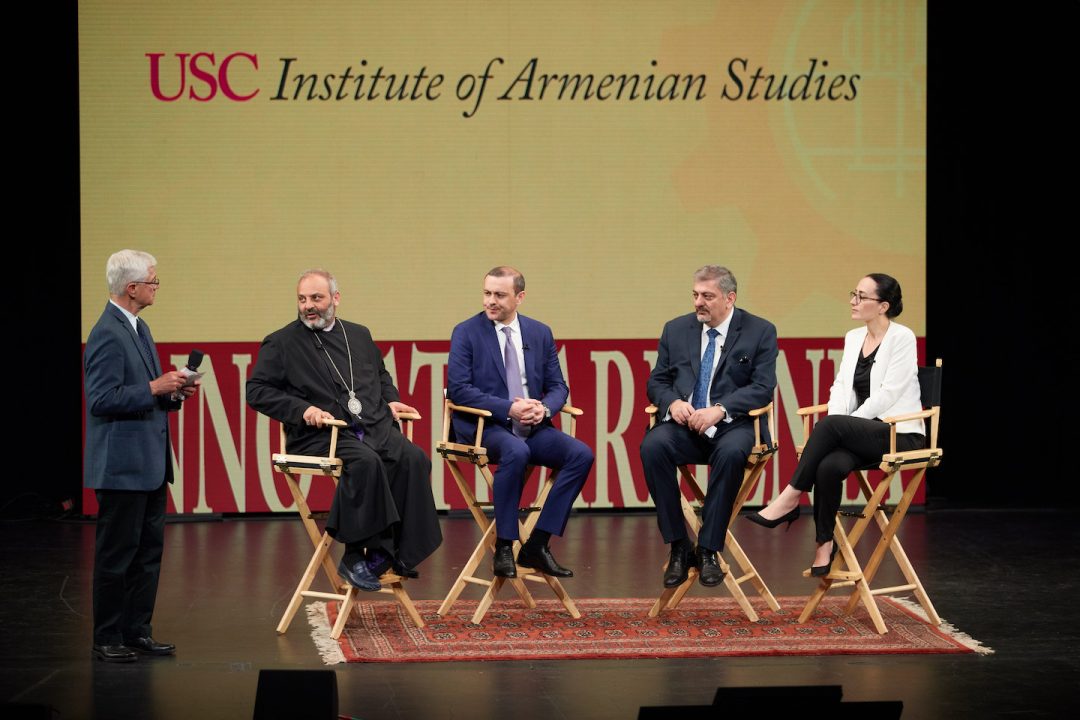
What happened when a delegation of high-ranking government officials traveled from Yerevan to Los Angeles to take part in INNOVATE ARMENIA on May 18 at the University of Southern California?
4,000 festival-goers watched live in Bovard auditorium and thousands tuned in on Facebook and Youtube, to hear their Ted-style talks both in English and in Armenian translation. And now, the world can listen to their talks as podcasts on the Institute’s ‘New Roads’ podcast channel.
In addition to giving talks on the USC Bovard stage, the government officials were available throughout the day to talk to festival goers and answer questions. On the day of, and throughout their stay, the officials met with both institutions and individuals in the Diaspora to try to find areas of meaningful collaboration.
“The urgency for this kind of relationship development was a direct outcome of the political changes taking place in Armenia since April 2018,” said Salpi Ghazarian, director of the USC Institute of Armenian Studies. “The audience, both physical and virtual, did not need to be convinced of the relevance of this kind of programming. They wanted more and were ready to directly engage and sustain that engagement.”

Armen Grigoryan, Secretary of the Security Council of the Republic of Armenia, talked about security policy, highlighting the challenges that Armenia is currently facing in that area. Grigoryan expanded on the traditional outlook of security to incorporate more than just physical forces.
“Immigration in Armenia is also a security challenge now and if we cannot solve that security issue that will also impact our military security,” Grigoryan said.
The impact of changing dynamics within Armenia was a common theme throughout the rest of the talks.
Other participants looked back to history to examine such changes. Armine Aleksanyan, Deputy Foreign Minister of Karabakh, touched on the challenges of those living there, as well as the difficulties in gaining international recognition for the republic. The support of the outside world — specifically the diaspora — she said, can strengthen and maintain the independence of Karabakh.
“Where we cannot go through the official channels, where we cannot knock the diplomatic doors, there are doors that can be opened by our compatriots living here,” Aleksanyan said.
Aleksanyan went on to thank the Institute for allowing her the opportunity to present “my people and our struggle.”

Dr. Irina Ghaplanyan, First Deputy Minister of Nature Protection, then took the stage to talk about elements that have made the preservation of resources difficult in Armenia.
Armenia has been ranked as the fourth most vulnerable country to climate change in the region, Ghaplanyan noted. She emphasized that steps need to be taken to counter negative environmental impacts, and a new vision needs to be defined in order to implement policy changes.
“We have already started to scrap the existing architecture and to inject the new concept. Not the compensation concept but the concept of mitigation, that we do not operate with the concept of polluter pays, but we prevent pollution to begin with,” Ghaplanyan said.
She concluded her talk by extending her appreciation towards Salpi Ghazarian, director of the Institute.
“In the many years I have known Salpi she has had an incredible source of energy and drive and putting together an event of this sort fourth year in a row takes the will power, takes incredible focus and definitely the energy that Salpi has,” Ghaplanyan said.

Becoming energy efficient and using resources wisely are also tied to education and access to information. Arevik Anapiosyan, the Deputy Minister of Education and Science, is responsible for development projects in the field of education.
“The Ministry of Education is trying to create this platform where we can have educational institutions and employers not working in silos but collaborating together,” Anapiosyan said.
“To have fundamental and sustainable strategy that we are going to meet the needs of the future job market we need to have vigorous research. The shortest way of raising the quality of education is by bringing research into higher education,” she explained.
The government officials talked about their policy goals and visions, and opened a pathway to dialogue, engagement and transparency.
Organized by the USC Institute of Armenian Studies, the Innovate Armenia program featured fifty participants, from six countries. This is the fourth time in five years that this unique festival of ideas and action has been staged by the Institute.










